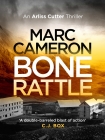Bone Rattle by Marc Cameron (ebook reader macos .TXT) 📗

- Author: Marc Cameron
Book online «Bone Rattle by Marc Cameron (ebook reader macos .TXT) 📗». Author Marc Cameron
Bone Rattle
Cover
Title Page
Dedication
Prologue
Alaska
Epigraph
Day One
Chapter 1
Anchorage
Chapter 2
Chapter 3
Chapter 4
Chapter 5
Chapter 6
Chapter 7
Chapter 8
Anchorage
Chapter 9
Juneau
Day Two
Chapter 10
Anchorage
Chapter 11
Chapter 12
Chapter 13
Chapter 14
Chapter 15
Chapter 16
Chapter 17
Chapter 18
Chapter 19
Anchorage
Chapter 20
Chapter 21
Chapter 22
Chapter 23
Chapter 24
Chapter 25
Chapter 26
Chapter 27
Chapter 28
Day Three
Chapter 29
Chapter 30
Chapter 31
Chapter 32
Chapter 33
Chapter 34
Chapter 35
Chapter 36
Chapter 37
Chapter 38
Chapter 39
Chapter 40
Chapter 41
Chapter 42
Chapter 43
Chapter 44
Chapter 45
Chapter 46
Chapter 47
Chapter 48
Chapter 49
Chapter 50
Chapter 51
Chapter 52
Chapter 53
Thirty seconds earlier
Chapter 54
Chapter 55
Chapter 56
Chapter 57
Epilogue
Acknowledgements
Grumpy Cutter’s Venison Stew
Grumpy Cutter’s Flaky Square Buttermilk Biscuits
About the Author
Also by Marc Cameron
Copyright
Cover
Table of Contents
Start of Content
To my brothers and sisters of the United States Marshals Service
America’s Star
Prologue
Alaska
A single bone – or even a bone shard – wouldn’t just slow work down. It would stop everything.
Dead.
The snort and belch of the backhoe rattling along the mountain made Merculief feel less isolated than he actually was.
There were thirty-seven men working at this mine, including the guy driving the backhoe and the laborer leaning on a shovel next to Merculief. That was way too many witnesses for anything sketchy to happen – other than having to endure a few elbows and junior-high-level taunts in the chow trailer. They wouldn’t have hired him if they didn’t want him around. Would they?
Merculief turned up the volume on his phone, letting “No One Knows” by Queens of the Stone Age pour through his earbuds. He tried to forget about the hatred, reminded himself that he could be working in an office, and kept his eyes peeled for bones.
Remote didn’t begin to describe the Valkyrie mine. He wasn’t just at the end of some dirt road or at the top of a mountain.
Roughly thirty miles south of Juneau by boat, the excavation project leading to the mine adit known as Valkyrie #3 cut along the side of the mossy-green mountain, tucked deep in a glacial valley inside Port Snettisham, a T-shaped inlet of pristine waters off Stephens Passage.
Everything here looked near vertical to Merculief, or at the very least, too steep for a road. But there had been a road, once upon a time, back in the glory days after Auke Chief Kowee guided Joe Juneau and Richard Harris to gold at Quartz Gulch. Avalanche chutes had washed a good portion of it away. Berry bushes bristled between the remaining timbers, hidden beneath the muck. The narrow ledge was rarely much wider than the backhoe tracks at any point, and much of that had been sheared off by heavy snow. Persistent rain turned the rock and freshly dug earth into soup, forcing the Native archeologist and the skinny laborer slouching next to him to be constantly on the move or risk sliding down the hillside into the raging creek that rushed along the valley floor. The mountain on the far side of the narrow valley rose steeply, absent the ugly excavation scar. Snowfields still perched higher up, shielded from the rays of the sun by the perpetual shadow of steep angles. Towering cedar and spruce, jagged boulders – it all felt close enough to touch.
Rain pattered on the hood of Merculief’s Helly Hansen jacket. He would have heard the pop, pop, pop of the droplets but for Queens of the Stone Age blaring in his earbuds. A steady wind blew down from the icefields above, making the raindrops sting his face if he looked in the wrong direction. Alaskans knew that cotton killed in the cold and damp. Merculief preferred layered wool and a waterproof rain suit. Southeast weather scoffed at “water resistant.” An oilcloth ball cap and tall rubber XTRATUF boots – often called “Juneau sneakers” – kept him relatively dry during the long hours he spent standing over the dig.
The big 953 Caterpillar track crawler belched and clanked, working steadily along the mountain. Its massive steel bucket swung back and forth overhead, chewing steadily through blueberry brush, moss, and a layer of deep brown earth. Almost black with age and tannin from the surrounding vegetation, a series of logs were arranged side by side on the ground, close together, like the walls of an old fort that had fallen over.
It was sad, in a way, to see the old corduroy road torn up. A piece of history – gone. But it was not a piece of that history Merculief was paid to care about. He breathed in the chilly, ionized scent of wet dirt and decaying wood. The rough-cut logs had been laid down over a century before, during the heyday of gold mining in the region. They formed a road to keep the wagons and ore carts out of the ever-present muck. Had there been no old road, the bosses would never have gotten the permits to build a new one. The Tongass National Forest was designated roadless. Period. Fortunately for old man Grimsson, the Valkyrie’s owner, he’d located this easement to the old mine adit. That meant he wasn’t building a new road. He was merely improving one that had been constructed in 1904 to carry ore out of the mine a half mile farther up the valley. Those miners had tunneled in two hundred yards and quit, not knowing they were a scant eleven feet from a rich vein of gold bearing quartz. Harold Grimsson had found it, and now he wanted to punch a hole through to the vein – but first he had to rebuild the road.
Core samples projected an ounce of gold for every six barrels of ore they hauled out of the mountain. In the mining world, that was a whole lot of gold. They were almost there. It had been the natural place to build a road in the early nineteen hundreds, when few cared about rolling roughshod over sacred Native sites. Unfortunately for Valkyrie #3, these last three hundred yards folded back and forth in a series of cliffs and crags, the perfect spot for a burial ground.
The twenty-eight-year-old archeologist focused on bones – and his music





Comments (0)